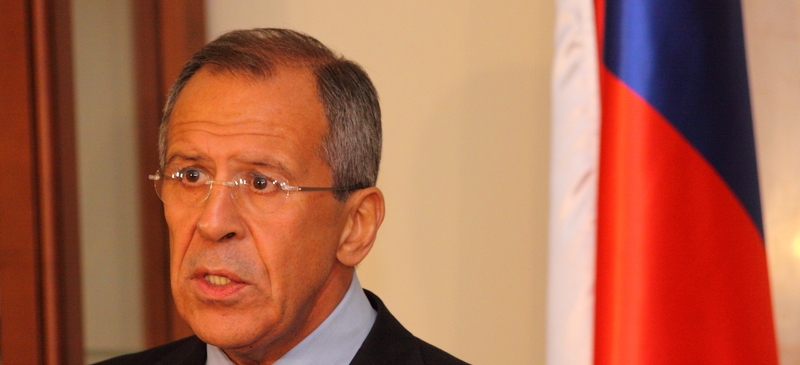
Let Russia show the way on Syria
Like him or loathe him over his stance on Syria, Russia’s foreign minister, Sergey Lavrov, is a better diplomat than most. Experience counts, and Lavrov has spent almost three decades at the United Nations. As a former senior Soviet diplomat and Russia’s permanent representative to the Security Council in the lead-up to the Iraq war, he has tenaciously resisted Western military intervention over three decades in countries where Russia’s interests were at stake. On Syria he is marshaling his arguments much more carefully than his Western counterparts.
On Syria, Lavrov is a realist in the Kissinger mould. He is acting on behalf of a Kremlin whose diplomatic relations are almost completely predicated on advancing Russian power. Russia is deeply concerned about the escalating threat to its influence in Syria — its only major ally in Arab Mediterranean.
But Moscow also knows that the writing is on the wall for the Assad regime and that its slow demise will likely precipitate an increasingly deadly civil war that will damage Russian interests.
To avoid this outcome, Russia has decided that the best option is to find a balance between the regime and the opposition that allows Moscow’s influence to endure. Like the Sicilian prince in Lampedusa’s novel “The Leopard” the people in the Kremlin know that “if we want things to stay as they are, things will have to change.”
Russia is also gravely concerned at the rise of jihadist groups in Syria and Lebanon as a result of the growing security vacuum in Syria. Hence, Moscow has called for an international conference to try to bring about a transition process that reverses Syria’s descent into chaos.
Even such unlikely bedfellows as Israel and Iran are likely to welcome a Russian conference on Syria. Tehran knows that it could be dragged into a proxy war in Lebanon that could irreparably damage its nuclear talks with the West, risking a military attack by the United States.
Israel is increasingly alarmed at the radicalisation of Syria’s youth, bellicose opposition rhetoric regarding the Golan Heights, and the prospect of Syria’s arsenal of chemical weapons falling into the hands of extremists. The enemy you know may be better than a failed state that is home to extremist nonstate actors. Nor is the descent of Lebanon into civil war in Israel’s interests — a takeover by the militarily superior Hezbollah militia would prompt calls for a re-invasion of Lebanon, requiring another prolonged Israeli occupation.
Moscow may not be motivated by international altruism, but it is right to criticise the West for not having any political plan for Syria. In several draft Security Council resolutions, rejected by Russia and China, the West has demanded that the Syrian security forces confine themselves to barracks. Lavrov has posed the question: Who would take their place to prevent even worse sectarian violence as victims of the regime seek revenge against their many neighbors who supported Assad? Western diplomats do not have an answer.
Such a lack of attention to detail from the West is hindering a diplomatic solution to Syria’s conflict. Western diplomats and officials have told Kofi Annan, the former UN secretary general, to negotiate a cease-fire with Syria and to establish a dialogue aimed at “political transition,” but they have given him few hints as to exactly what such a transition should look like. There are also currently no inducements for the regime to change its behavior.
The West should put aside its skepticism: Clear-eyed thinking on a realistic engagement with the Syrian regime is required. Given the entrenched position of the regime, the West cannot expect an immediate happy outcome to such a transition process; the current Syrian military leadership will not give up its power over all aspects of domestic and foreign policy. But it may allow its future influence and discretion to be checked by an elected Parliament and a reformed judicial system.
If the regime commits itself to free and fair elections, the West should suspend some economic sanctions. An elected Parliament should then draft a new constitution. In the same way as Turkey’s democratic transition took time, an initial balancing between the president, the military and a democratically elected Parliament in Syria is probably the best that can be hoped for in the short-term.
How and when to bring war criminals to justice will remain a question that Syrians will have to grapple with over a longer period of time.
An attempt by Russia to negotiate a political transition in Syria should be welcomed. Moscow has made it clear that its future relations are not tied to the power status quo in Damascus.
A phased, compromise transition between the government and opposition groups is probably the only way to avoid worse chaos in the future. This does not mean offering a carte blanche to a brutal regime that has engaged in a litany of appalling war crimes. But neither the Syrian people nor the West can afford to let the current trend continue: There is too much at stake in terms of lives and strategic interest. It is time for some diplomacy based on realism rather than wishful thinking.
Edward Burke is a foreign policy fellow at the Center for European Reform in London.
